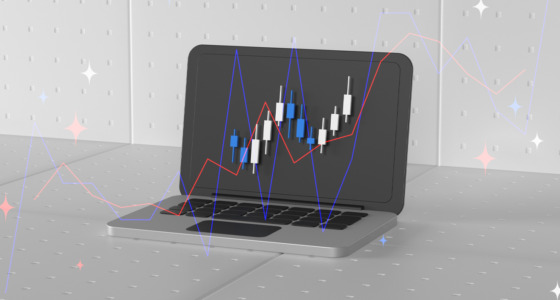

There are several trading strategies every trader should learn. They are built on basic concepts. The breakout trading strategy is one of them. Although it’s not the easiest trading approach, if you learn it step-by-step, breakouts will help you open more successful trades.
It may be a legend, but in 1983, Richard Dennis held a turtle experiment, where he taught newbies (turtles) a breakout trading strategy. According to the results, turtles earned over $175 million in only five years.
What is a breakout?
The strategy is based on the breakout concept. A breakout is a market condition when a price of an asset moves beyond either the support or resistance level (instead of rebounding from it) with increased volume. Thus, a trader should sell if the price breaks below the support boundary and buy if the price closes above the resistance level.
The breakout strategy is a momentum strategy, which means a trader should be fast and quite aggressive. The key to success is to catch the early stages of the trend formation/continuation and enter the market at a breakthrough. Remember: breakouts may occur after a short-term correction within the overall trend.
The breakout strategy is one of the favorite approaches of active traders. Although it is based on increased price volumes, it can provide limited risks if used properly.
The idea seems simple, but the mechanics are not. You should be equipped with knowledge of certain patterns and indicators that can provide signals on the possible breakout. Moreover, you should have enough skills to catch the momentum.
How a breakout trader works
Breakout traders look for different financial assets, such as stocks, that have been restricted to trading only above a particular level or under a particular level, even if there were several breakthrough attempts.
The breakout trader has a unique way of seeing things. For instance, when a technical indicator is unable to break through a specific area, it will become a breakthrough opportunity as soon as it does. A price that is confined and then eventually manages to break out will look like an opportunity to make a profit, so the trader will take action. Based on whether the breakout is bearish or bullish, the breakout will signal a chance to purchase or sell the security.
Types of breakout patterns
When it comes to breakout patterns, you should know that they come in different types. The main types of breakout patterns that you should look for include:
· Fundamental data
Fundamental data can take advantage of breakout trading. It’s easy to understand it. Let’s say that a firm has been reporting very similar earnings for every quarter of the previous year. After some time, they blow away estimates one quarter and manage to report increased earnings, but also with projections for better earnings moving forward.
It’s possible that the business has developed a product that is now in demand, or it has discovered a way to improve an older product that can now help people even more. As a result, the earnings are breaking out of the ordinary pattern. As such, there is a sign that this is a new opportunity to buy.
Now, there is also the possibility for a firm to report earnings that are worse than the ones in the past. This is also a breaking of the old pattern, but in this situation, it may be a sign that it is time to sell.
· Chart patterns
If there is one type of breakout that is frequently seen in trading, that is chart patterns. This breakout form involves channels, cup and handle, triangles, head and shoulders, rectangles, wedges, and expanding ranges.
When the price moves in a certain way, the trader will see several patterns. So, they will draw trendlines on the pattern, which shows where the resistance and support levels are. Prices enter the breakout direction when they manage to break out of the pattern.
· Technical indicator
Technical indicators are not that different from chart patterns. They actually work quite similarly, and they even have some of the patterns used by charts patterns.
A relative strength index or RSI indicator can create a triangle pattern. When the price ends up breaking out of the triangle to the downside, it may be a signal to sell the security, or if it breaks higher, it may be a sign to purchase the security.
When should we avoid trading breakouts?
Even if the breakout trading strategy seems convenient at the time, you should be aware of when to employ it or not. In fact, there are many situations when trading breakouts can do more harm than good.
For example, you shouldn’t consider the breakout strategy when there is no tight trading consolidation range on the breakout indicator before the breakout. Similarly, you should also not use the breakout trading strategy when the stock market is not close to the resistance and support levels. When they are too far, the trade will likely not be a success.
Before you do any breakout trade, you should look for any potential hurdles or obstacles underfoot or overhead. These could affect the decline or advance.
Furthermore, you should stay away from trading breakouts when the break is set against a possible dominant pressure.

How to apply the breakout trading strategy
To catch a signal of the breakthrough, you need to use certain indicators and patterns that reflect a trend change (or its continuation after a short-term correction), as well as increased price volumes.
Usually, the most significant price movements occur after channel trading and the formation of breakout chart patterns, such as:
- Triangles
- Flags
- Flat tops and bottoms
- Wedges
- Head and shoulders
- Inverse head and shoulders.
As for indicators, you can use the Relative Strength Index, Stochastic, MACD, and Bollinger Bands to confirm a breakout.
It’s also vital to measure the price volume. As you may remember, the volume is supposed to rise at a breakout and after it for a while. Increased volumes reflect the strength of traders who push the price beyond strong levels. The most outstanding volume indicators are Volume, On Balance Volume, and Money Flow Index.
Trading strategy
You should remember that there is no best breakout trading strategy. The effectiveness of any trading approach depends on subjective factors, including the amount of funds you have, trading risks you can bear, and the period you want to hold a position over. Although there are numerous types of breakout trading strategies, below, you will find the basic trading approach that can be customized according to your trading style.
1. Find a suitable asset
Breakouts occur in certain market conditions. Thus, the first step is to find an asset that suits particular conditions. Breakouts happen after price correction. So, you need to find an asset that has been trading sideways for a while.
2. Draw support and resistance levels
As the idea of breakout trading is a breakthrough of one of these levels, you should set them on the price chart. The reliability of the level can be defined by the number of times the price touched it. The more time the price has rebounded, the stronger the level is. It’s also worth checking how long the level is. If it has been in play for a while, there is a sign of an upcoming breakout.
3. Apply indicators and look for chart patterns
You should implement two indicators — or find a pattern and use an additional indicator to get signals of the upcoming breakout. Remember to use volume indicators that will signal how strong the market participants are.
4. Enter the market
The key factor to successfully implementing this strategy is to enter the market near the beginning of a strong trend movement. However, it’s dangerous to open a trade too early. That’s why you should look for confirmations. For instance, above-average volume and closure of a trading period beyond the broken level will help you define whether the price is strong enough to keep moving within the trend.
If you miss finding a confirmation, you may meet with a fake breakout or fakeout. It’s a market condition when the price breaks beyond a support or resistance level, but traders aren’t strong enough to push the price further. As a result, it moves back within the previous trading range.
5. Exit the market
It’s recommended to set stop-loss and take-profit orders before you enter the market. If you trade a chart pattern, then there are established rules on the approximate size of the price movement. If there is no chart pattern, you can determine an appropriate take-profit level by evaluating the asset’s recent movements. Measure recent price swings and find their average.
To set a stop-loss level, you can use previous resistance for a sell trade and previous support for a buy trade. You may be confused now, but it’s a common rule that you can use the resistance level the price broke above as new support and the support level the price broke below as new resistance.
Final thoughts
The breakout trading strategy may seem risky, as it requires quick actions. However, if you practice it on different timeframes with various trading instruments, you will be able to use it effectively. As the risk of a fakeout is very high, you should remember about stop-loss orders. They will help to limit the risks of capital loss.
No strategy can guarantee a 100% correct outcome of the trade.










